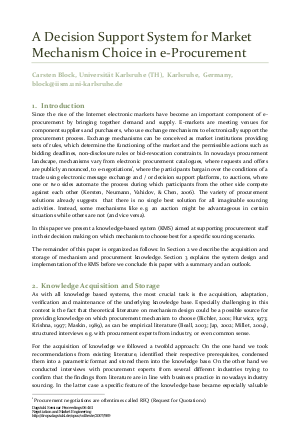A Decision Support System for Market Mechanisms Choice in e-Procurement
Author Carsten Block
-
Part of:
Volume:
Dagstuhl Seminar Proceedings, Volume 6461
Part of: Series: Dagstuhl Seminar Proceedings (DagSemProc) - License:
 Creative Commons Attribution 4.0 International license
Creative Commons Attribution 4.0 International license
- Publication Date: 2007-05-10
File

PDF
DagSemProc.06461.5.pdf
- Filesize: 286 kB
- 4 pages
Document Identifiers
Subject Classification
Keywords
- Negotiation
- electronic auction
- e-auction
- decision support
- DSS
- strategic sourcing
- SRM
- procurement
- knowledge base
- expert system
Metrics
- Access Statistics
-
Total Accesses (updated on a weekly basis)
0Document
0Metadata
Abstract
Since the rise of the Internet electronic markets have become an important component of e-procurement by bringing together demand and supply. E-markets are meeting venues for component suppliers and purchasers, who use exchange mechanisms to electronically support the procurement process. Exchange mechanisms can be conceived as market institutions providing sets of rules, which determine the functioning of the market and the permissible actions such as bidding deadlines, non-disclosure rules or bid-revocation constraints. In nowadays procurement landscape, mechanisms vary from electronic procurement catalogues, where requests and offers are publicly announced, to e-negotiations , where the participants bargain over the conditions of a trade using electronic message exchange and / or decision support platforms, to auctions, where one or two sides automate the process during which participants from the other side compete against each other (Kersten, Neumann, Vahidov, & Chen, 2006). The variety of procurement solutions already suggests that there is no single best solution for all imaginable sourcing activities. Instead, some mechanisms like e.g. an auction might be advantageous in certain situations while others are not (and vice versa). In this paper we present a knowledge-based system (KMS) aimed at supporting procurement staff in their decision making on which mechanism to choose best for a specific sourcing scenario.
Cite As Get BibTex
Carsten Block. A Decision Support System for Market Mechanisms Choice in e-Procurement. In Negotiation and Market Engineering. Dagstuhl Seminar Proceedings, Volume 6461, pp. 1-4, Schloss Dagstuhl – Leibniz-Zentrum für Informatik (2007)
https://doi.org/10.4230/DagSemProc.06461.5
BibTex
@InProceedings{block:DagSemProc.06461.5,
author = {Block, Carsten},
title = {{A Decision Support System for Market Mechanisms Choice in e-Procurement}},
booktitle = {Negotiation and Market Engineering},
pages = {1--4},
series = {Dagstuhl Seminar Proceedings (DagSemProc)},
ISSN = {1862-4405},
year = {2007},
volume = {6461},
editor = {Nick Jennings and Gregory Kersten and Axel Ockenfels and Christof Weinhardt},
publisher = {Schloss Dagstuhl -- Leibniz-Zentrum f{\"u}r Informatik},
address = {Dagstuhl, Germany},
URL = {https://drops.dagstuhl.de/entities/document/10.4230/DagSemProc.06461.5},
URN = {urn:nbn:de:0030-drops-9891},
doi = {10.4230/DagSemProc.06461.5},
annote = {Keywords: Negotiation, electronic auction, e-auction, decision support, DSS, strategic sourcing, SRM, procurement, knowledge base, expert system}
}
